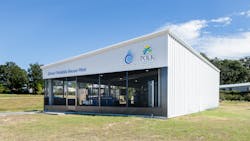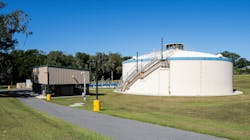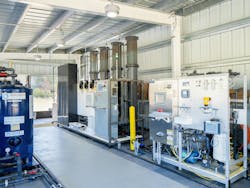Few places in the U.S. have a more dire need for securing sustainable water resources than Florida. More than 75% of the state’s drinking water supply comes from groundwater, a source increasingly pressured by rapid population growth, a major agricultural industry, and millions of visitors to the state’s many attractions.
With Florida’s daily demand expected to increase by another 1.1 billion gallons over the next decade, the search for alternative sources to augment this precious resource in many areas of the state has intensified. Over the past few years, more than a dozen jurisdictions have implemented pilot programs to evaluate the feasibility of various reuse technologies, including direct potable reuse (DPR).
One such effort can be found in Polk County, where the new $6.8 million Cherry Hill Water Production Facility (WPF) marks Florida’s first effort to test the feasibility of integrating DPR at a water treatment plant, rather than a wastewater facility as is typically the case. Operational since November 2023, the Cherry Hill pilot plant is providing valuable insights into an approach that could substantially reduce infrastructure construction and operation costs while also providing a viable long-term alternative water supply option.
Increasing infrastructure intricacies
Located between Orlando and Tampa, Polk County is one of the fastest growing jurisdictions in both Florida and the U.S. Approximately 200,000 people have moved to the county since 2020, bringing the population to more than 818,000 according to the U.S. Census Bureau. Not surprisingly, this growth has put tremendous pressure on the county’s existing water resources, including both the Upper Floridian Aquifer and groundwater sources, such as lakes and rivers.
With continued growth sure to come, Polk County Utilities (PCU) in 2021 selected Dewberry, a privately held professional services firm, to help carry out a strategy for increasing the resilience of its water supply to support future demands, beginning with the planning and design of a new water production facility (WPF) in the Cherry Hill area near Lakeland. As part of the project, Dewberry performed extensive hydraulic modeling for the service area to determine the best approach to not only optimize available water supplies, but also achieve system-wide operational efficiencies. Based on the findings, PCU elected to make the Cherry Hill WPF one of three regional plants to serve its Northwest Regional Service Area, each of which would be configured to receive water from multiple sources to maximize flexibility.
The strategy would also enable PCU to shutter several smaller existing WPFs to optimize operational and maintenance efficiencies, and alleviate stress on the Florida Aquifer by plugging and abandoning wells adjacent to sensitive environmental areas.
The project also aimed to provide an opportunity for PCU to investigate DPR as a future water supply option for the county. Few locations were better suited for an innovative pilot plant than Cherry Hill, as the 10-acre site had previously served as a spray field for public access reuse.
Taking advantage of an existing 24-inch-diamater reclaimed water supply pipe linked to PCU’s Northwest Regional Wastewater Treatment Plant, Dewberry augmented the Cherry Hill WPF design with $1.75 million DPR pilot plant, funded in part by a $795,000-grant from the Southwest Florida Water Management District.
Along with the innovative approach of co-locating a DPR pilot plant with a water treatment plant, the Cherry Hill project offered PCU other benefits as well. Because DPR systems are typically co-located at wastewater treatment facilities, the setting’s odors and other distractions often compromise utilities’ educational outreach efforts to develop public understanding and trust in the technology’s safety and reliability. The Cherry Hill WPF setting, on the other hand, allows PCU to focus on DPR’s benefits, and its role in supporting the region’s future.
A facility for the future
Dewberry’s design for the Cherry Hill WPF focused on adding drinking water capacity while also minimizing long-term effects on the already stressed Lower Florida Aquifer. The project includes two onsite wells, each rated at 3.12 million gallons per day (MGD). Sited in an area that minimizes effects to the aquifer, the new wells are designed to optimize withdrawals and minimize drawdown in the sensitive Hillsborough River groundwater basin. One of the two wells was built with a larger, 24-inch casing diameter to safely accommodate future deepening into the aquifer.
Other elements of the facility include a one-million-gallon prestressed concrete ground storage tank with tray aerator, high-service pumps with a capacity of up to 9 MGD, a sodium hypochlorite storage and feed system with a pre-chlorination and flow-paced post-chlorination feed points, and a 750-kW generator with fuel tank. A precast building houses the WPF’s electrical and controls equipment, which is linked to PCU’s county-wide network.
The Cherry Hill pilot DPR treatment process takes treated effluent from the Northwest Regional Wastewater Treatment Plant through a six-step, multibarrier approach that includes flocculation/sedimentation, ozone injection, biologically activated carbon (BAC) filtration, ultrafiltration, granulated activated carbon filtration, and ultraviolet disinfection.
With a flow rate of 10 to 20 gallons per minute, the process brings the effluent quality up to state drinking water standards by removing suspended solids and other residue, and destroying pathogens, bacteria and viruses. Regular testing at multiple stages verifies that contaminants can be removed while adhering to rigorous state and federal drinking water standards.
The ultimate DPR system will be designed for up to one 1 MGD of reclaimed water daily with approximately 2 MGD of traditional groundwater from the conventional treatment system being blended together in the future.
Pilot testing of the process will continue through the remainder of 2024, with an eye toward bringing the reclaimed water online once FDEP regulations governing such systems are in place. PCU plans to initially maintain the 15-gpm flow rate, and continue testing the system. Should the program unfold as expected, PCU will evaluate options for larger-scale DPR operations as funding becomes available.
Putting knowledge to work
Polk County’s commitment to water supply sources that are both environmentally sustainable and affordable to our customer base prompted a full exploration of the available options available. Thanks to a successful collaboration between PCU and the Southwest Florida Water Management District, the Cherry Hill DPR pilot project allows county leaders to evaluate another option for a potable water source that takes advantage of the specific conditions in the county’s Northwest Regional Service Area.
The initiative already has provided a wealth of benefits to PCU and the region by successfully developing an innovative strategy to bring a reliable water supply to the area that, due to limited sources, was vulnerable to drought and other restrictive pressures.
Though many steps remain before the reclaimed water technology becomes a fully integrated part of Florida’s water future, the Cherry Hill DPR pilot plant already has fulfilled PCU’s vision as a valuable educational tool.
In addition to students and local residents who receive water from the Cherry Hill WPF, the DPR facility has attracted the interest of representatives of other utilities looking for ways to augment their own water supplies. PCU also organized a tour with local business leaders to help them better understand the need for alternative water supply in an area that receives so much rainfall, and how DPR is a viable approach to supporting the area’s long-term growth. Sharing PCU’s experience with DPR through data sharing, tours and presentations of the facility will remain a critical, ongoing part of the pilot project’s mission.
PCU also has had the unique opportunity to be actively engaged with Florida regulators as they chart the role water reuse will play in the years to come, the agency has welcomed opportunities to share some of the project’s many planning and implementation lessons learned with peer utilities.
Among the most important of those is the critical need for comprehensive staff training to facilitate both a smooth start-up of the system, and long-term operation to ensure both reliability and timely, appropriate response to issues if needed. Similarly, automation and SCADA control is critical to reduce costs during the extended testing and operation period necessary to ensure the technology at each location is running correctly.
Perhaps most important element is frequent, proactive public engagement and education tailored to the interests of specific audiences — i.e., students, ratepayers, business and government leaders, engineers, and many others. PCU’s ability to co-locate its DPR pilot plant at a water treatment facility proved to be a valuable tool in sharing these important messages while also achieving the goal of providing a resilient and reliable water supply for future generations.
About the Author

Robert Beltran
Robert Beltran, PE, DBIA is a water policy and planning expert with more than 30 years’ experience working on municipal projects in Florida. He is currently leading Dewberry’s Florida water team and is the former executive director of the Southwest Florida Water Management District (SWFWMD).

Tamara Richardson
Tamara Richardson, PE, has served as Director of Polk County Utilities since December 2017. She and her team are responsible for all functions of the Utilities Division, including water production and distribution, wastewater collection and treatment, reclaimed water production and distribution, compliance and capacity, capital investments, maintenance and repairs, customer service and billing, and the financial management of these efforts.



